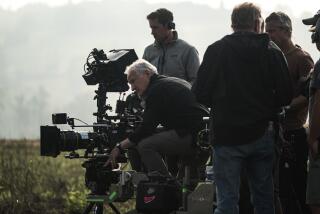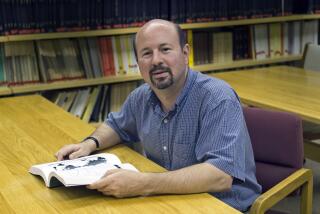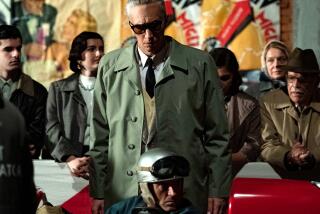After Sale, MiniMed Founder Returns to the Start-Up Lab
- Share via
By selling off insulin pump maker MiniMed Inc. for more than $3 billion, biomed mogul Alfred E. Mann cut the cord from the company that was almost synonymous with his name--and that made him a fortune.
But to Mann, the separation wasn’t traumatic. Even as the ink was drying on the deal to sell MiniMed and its sister firm, Medical Research Group Inc., Mann was plotting the course for two more of his biotech start-ups: one that makes ear implants and the other seeking to develop a cancer vaccine.
These companies, Advanced Bionics of Valencia and Sylmar-based Mannkind Corp., are at the stage of development that gives him the biggest kick.
“I’m most excited and interested in the start-up and seeing it through its adolescence,” Mann said. “When it gets to be a mature adult, it has less interest for me.”
Mann, who has launched 10 companies since the 1950s and sold six, has hinted that he might take some of his progeny public. If so, analysts said, Wall Street will be anxiously waiting to see whether the Mann magic can work again.
“Looking back over the past decade, the landscape is littered with [medical device] companies that had interesting products but that ended up failing for many reasons,” said Michael Weinstein, managing director of J.P. Morgan. “Out of that landscape, MiniMed stands out as a remarkable success. I think a good portion of that is due to Al and his relentless drive to see his companies succeed. Al’s proven success opens a lot of doors for new companies.”
At $3.28 billion, the sale of MiniMed to Minneapolis-based Medtronic Inc. ranks as the largest sale of a Mann corporate offspring. (The deal also included the purchase of Mann start-up Medical Research Group Inc. for $420 million.)
Mann said he might take Advanced Bionics public next year. In addition, he owns three other companies that he said he might combine or take public:
* CTL Immunotherapies Corp., based in Chatsworth, which is developing therapeutic vaccines for cancer and other chronic diseases.
* AlleCure Corp., also in Chatsworth, which is developing vaccines for allergies and asthma.
* Pharmaceutical Discovery Corp. in Elmsford, N.Y., which is developing technologies for nasal and pulmonary drug delivery.
He also owns a majority stake in Second Sight of Valencia, which is attempting to develop a visual prosthesis for the blind.
Each company was either launched by Mann or adopted by him at an early stage of development.
“I put $130 million into those three,” said Mann, speaking of the ones he plans to combine. “And I put in an additional $50 [million] to $60 million in Advanced Bionics.
“So I’ve put in lots of money,” he said with a laugh.
And he’s made lots of money.
His Sylmar-based Pacesetter Inc., a leading manufacturer of cardiac pacemakers, fetched a price tag of about $150 million when it was sold to German conglomerate Siemens in 1985. Pacesetter originally included MiniMed among its divisions, but Siemens passed on that portion, Mann said. (Siemens later sold the Pacesetter unit to St. Paul, Minn.-based St. Jude Medical Inc.)
And the $48-per-share price offered for MiniMed makes his 17 million shares worth $816 million. Not bad for something that started, according to Mann, as “a small group of people doing research on insulin pumps.”
Mann, in turn, takes much of the money and pumps it back into science, pledging $100 million each to USC and UCLA for biomedical research.
There’s the Alfred E. Mann Foundation, a nonprofit research organization Mann set up in 1986.
And there’s the steady stream of cash flowing to the Mann companies.
The money--coming at a time when venture capital funds were not exactly overflowing to the Los Angeles biotech market--and Mann’s unbridled passion have helped give a boost to the local biotech sector, insiders said.
And his efforts to jump-start Los Angeles’ nascent biotech industry stand out in part, they say, because at this point the pool is still so small, compared with more advanced biomed centers such as San Diego, San Francisco and Silicon Valley.
“I think Al Mann would stand out in any biotech community as a major biotech figure,” said Fariba Ghodsian, head of health-care research for Roth Capital Partners in West Los Angeles and a member, along with Mann, of the Southern California Biomedical Council. “Obviously, in L.A., we don’t have many such figures, so he becomes even more of a standout.
“I think he has had a tremendous effect on the growth of biomed in Southern California.”
And when the next Mann offspring tests the waters on Wall Street, will the Alfred Mann name have cachet?
“I hope so,” Mann said. “I’m not counting on it, but I have had a pretty decent track record of launching successful companies.”
(BEGIN TEXT OF INFOBOX / INFOGRAPHIC)
Alfred E. Mann
Age: 75
Born: Portland, Ore., the second of three children.
*
Education: Bachelor’s and master’s degrees in physics at UCLA.
*
First business start-up: Spectrolab. Launched in 1956, the company developed solar electric systems for spacecraft and is now part of Boeing.
*
Other Mann start-ups: MiniMed, which makes insulin pumps; Advanced Bionics, which develops hearing-aid implants; Mannkind of Sylmar, which is developing vaccines to fight cancer.
More to Read
Inside the business of entertainment
The Wide Shot brings you news, analysis and insights on everything from streaming wars to production — and what it all means for the future.
You may occasionally receive promotional content from the Los Angeles Times.










